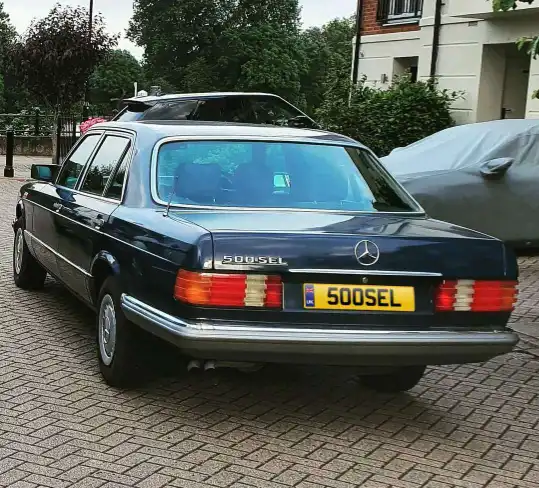Is Your Classic Car A Historical Vehicle?
- Advice
-
Jul 30
- Share post

You’ve owned your classic car for a while and it’s fast approaching it’s 40th birthday. That means no road tax, no more MOTs and no more pesky emissions laws like ULEZ and CAZ – right? Well, sort of – in this article we’ll dig into everything you need to know about historical vehicles and how to obtain historical status (and all the benefits) for your pride and joy. So, let’s start with a simple question…
What is a Historical Vehicle?
Great question and if the DVLA made sense there would be a straight answer. Basically, it depends on whether you are talking about Tax, MOTs or emissions legislation like ULEZ in London or CAZ in Birmingham. So let’s break it down and start with a simple one.
Will my car be exempt from the MOT test?
This is a straightforward one, if you’re vehicle was registered or built 40 years ago, you’re not legally required to have a valid MOT. You do still have to make sure the car is roadworthy, more on that here. There is one condition in that the vehicle can’t be heavily modified;
“no ‘substantial changes’ have been made to the vehicle in the last 30 years, for example replacing the chassis, body, axles or engine to change the way the vehicle works”
It’s a bit down to interpretation what exactly constitutes a ‘substantial change’ so if in doubt, run it by the DVLA. Anecdotally, we’ve heard of engine swaps being allowed on the basis that it was available within that model range despite not being original to the particular car in question.
Although not a legal requirement, you can still get an MOT test done and receive a certificate. A lot of classic car owners do this for piece of mind and even those that are handy with the spanners often like to have it as part of the maintenance history. There’s nothing like a wad of advisory free certificates to get a potential buyer drooling over your motor. If you need to prove that your vehicle is exempt from the MOT test, you can complete a V112 form here.
What about Vehicle Excise Duty (VED)?
You’d think that the same logic would apply to tax but in their infinite wisdom, the DVLA have decided that VED (often still referred to as road tax) should be treated differently. You can apply for the ‘historical tax class’ if from April 1st for any given year, your car was 40 years old before January 1st of that same year. For example, if you currently own a car registered in July of 1985, you won’t be eligible for historical status until April 2026. This rule applies to vans and bikes too but there are a few exceptions.
- The vehicle can’t be used for any trade or commercial purposes
- You can’t use the car for hire and reward – unlikely you’ll be delivering packages in a 40 year old motor so this is going to apply to chauffeuring mainly
It’s funny how often this time rule is misunderstood; we often see for sale ads stating a car is exempt from various things despite having another year to reach the cut off. It’s not just private sellers that are guilty of this, plenty of dealers have misleading listings, so be careful if you’re in the market for a classic car.
How do I apply for the VED Exemption?
Annoyingly, you can’t apply online so you’ll need to march down to your local post office armed with the following.
with V5C log book, V11 tax reminder letter and V112 MOT exemption and they’ll send th
- V5C log book
- V11 tax reminder letter
- V112 MOT exemption OR an MOT certificate that’s valid when the tax starts
The chaps at the post office will send off your documents to the DVLA to update the vehicle’s records. Any tax your owed will be refunded.
I’m ready to hit the road – what about clean air zones such as the ULEZ in London?
This is where having a historical vehicle really pays off in certain parts of the country. London now has an ‘Ultra Low Emission Zone’ banning certain types of polluting vehicles entering the area unless a daily £12.50 charge is paid.
The ULEZ exemption follows the same rule as VED exemption so you’ll have to apply for the historical tax class. Transport for London (Tfl) who run the scheme have not been the best at rolling out the recent expansion of the zone so do yourself a favour and get them to confirm in writing that your exempt in case you get an ‘accidental’ fine later. At the time of writing, the ULEZ currently operates roughly within the the North Circular (A406) and South Circular (A205) but is expanding beyond this area from August 29th 2023.
The historical exemption also applies to the Clean Air Zone (CAZ) that operates in Birmingham. Other cities in UK are likely to adopt similar zones so fingers crossed the historical vehicle exemption is upheld is these places too.
Why do Historical Vehicles get all these exemptions?
It’s simple really – money! The UK classic car industry is worth billions, over £700m coming from the insurance sector alone. Treating older vehicles in the same manner as modern ones would really handicap the industry and significantly impact the economy. It’s worth remembering that the classic car industry is so far reaching. Think of all the different areas such as sales, rental, insurance, parts, restoration, events just to name a handful.
However, it’s not all based on industry. There is an understanding that classic car owners are generally enthusiasts who thoroughly maintain their vehicles and cover very few miles each year. Therefore, the chances of owners driving around in deathtraps is pretty slim. Likewise, even though older engines might not be the most efficient or have things like catalytic converters, the environmental impact is a drop in the ocean compared to modern commuter vehicles.
A closing thought…
If you’re car is 40 year old – congratulations, time to reap the rewards! If you’re not quite there, it may be worth holding on. Many vehicles are holding their values extremely well and even continuing to appreciate. If you’re thinking of selling up in the near future, that historical status could certainly add additional value to your vehicle particularly if you live somewhere like London or Birmingham.
